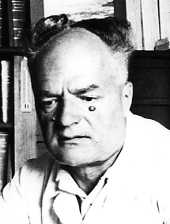Édouard Chatton
Édouard Chatton (French pronunciation: [edwaʁ ʃatɔ̃]) (11 October 1883, Switzerland (Romont) – 23 April 1947, France (Banyuls-sur-Mer))[1] was a French biologist who first characterized the distinction between the prokaryotic and eukaryotic cellular types. Chatton invented the terms and published them first in his 1925 paper, Pansporella perplex: Reflections on the Biology and Phylogeny of the Protozoa.[2]
Édouard Chatton | |
|---|---|
 | |
| Born | 11 October 1883 |
| Died | 23 April 1947 (aged 63) |
| Nationality | |
| Known for | Distinction between prokaryotes and eukaryotes |
| Scientific career | |
| Fields | Biology |
| Author abbrev. (botany) | Chatton |
Chatton's initial interest was in various human pathogenic protozoa, members of the Apicomplexa and Trypanosomatids. He later expanded his studies to include marine protists, helping to contribute to the description of the dinoflagellate protists.[3] At the Pasteur Institute he met and became a mentor to André Michel Lwoff, future Nobel Laureate in Physiology or Medicine. The two scientists remained associates until Chatton's death in 1947.
%2C_parasites_of_cephalopods_of_the_Mediterranean_Sea.png)
References
- Jean-Jacques Amigo, « Chatton (Édouard, Pierre, Léon) », in Nouveau Dictionnaire de biographies roussillonnaises, vol. 3 Sciences de la Vie et de la Terre, Perpignan, Publications de l'olivier, 2017, 915 p. (ISBN 9782908866506)
- Sapp, J. (2005). "The Prokaryote-Eukaryote Dichotomy: Meanings and Mythology". Microbiology and Molecular Biology Reviews. 69 (2): 292–305. doi:10.1128/MMBR.69.2.292-305.2005. PMC 1197417. PMID 15944457.
- Soyer-Gobillard, Marie-Odile (2010). "Edouard Chatton (1883–1947) and the dinoflagellate protists: concepts and models" (PDF). International Microbiology. 9 (3): 173–177. PMID 17061207. Retrieved 2013-05-20.